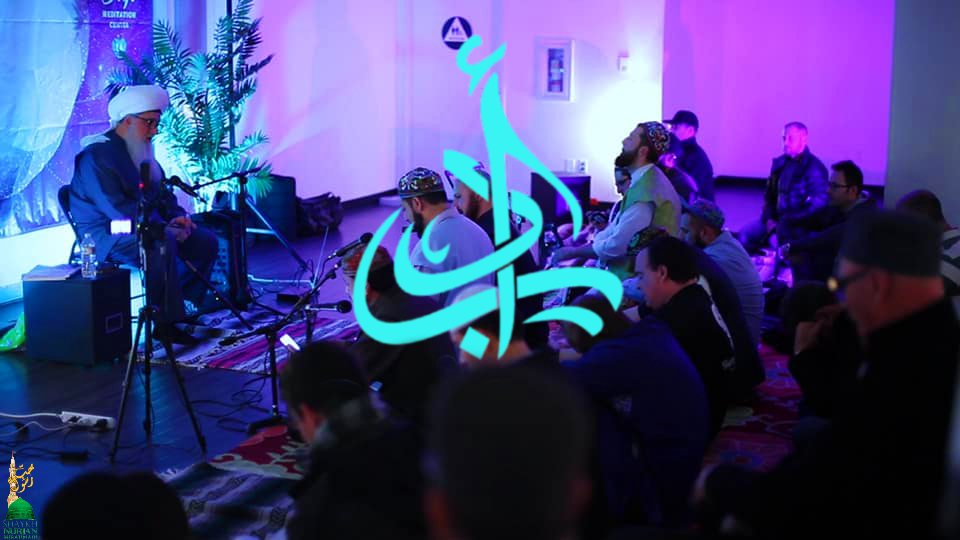
Salah That Makes Up 1,000 Years of Missed Salah Prayers – Ways of Ma’rifah
This Article Has Been Translated
![]()
Urdu
From the Realities of Mawlana (Q) as taught by Shaykh Nurjan Mirahmadi.
A’udhu Billahi Minash Shaitanir Rajeem
Bismillahir Rahmanir Raheem
I seek refuge in Allah from Satan, the rejected one
In the Name of Allah, the Most Beneficent, the Most Merciful
The Last Day of Ramadan is the Most Blessed
 Jumah tul Wida, Jumah tul Yatima, the Jummah of the farewell of Ramadan. That this Friday will be the last Friday of Ramadan. We pray that Allah (AJ) dress us and bless us from all its realities, and the angel of Ramadan to dress us and bless us from all its realities. And that the Laylatul Eid, the night before the Eid, if Eid is on Sunday that would be a Saturday night; if they announce on Saturday, that would be a Friday night. That night of Eid is the most important night of Ramadan. That’s in which Allah (AJ) will give the blessings and ni’mat, what they call payday.
Jumah tul Wida, Jumah tul Yatima, the Jummah of the farewell of Ramadan. That this Friday will be the last Friday of Ramadan. We pray that Allah (AJ) dress us and bless us from all its realities, and the angel of Ramadan to dress us and bless us from all its realities. And that the Laylatul Eid, the night before the Eid, if Eid is on Sunday that would be a Saturday night; if they announce on Saturday, that would be a Friday night. That night of Eid is the most important night of Ramadan. That’s in which Allah (AJ) will give the blessings and ni’mat, what they call payday.
Spend the Last Night of Ramadan in Prayer, Not Bazaars
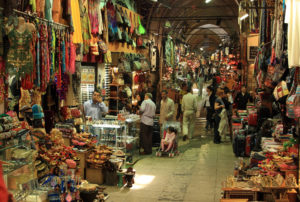 Thirty days of struggling and working in the way of Allah (AJ), and Allah (AJ) gives His pay on the last day. To give every ni’mat and every blessing and every dressing so that to be dressed by it, and we pray that shaitan doesn’t deceive us and take us away from that and send us into bazaars (market place) and unnecessary places. Alhamdulillah, with whatever’s happening on this earth, Allah (AJ) has everybody confined to a particular space. That that night is a night in which to be in zikr (remembrance), to be in your salah (prayer) and your dua’s (supplications) and every type of worshipness, that ‘Ya Rabbi, if I did anything wrong forgive me. If I did any imperfections, forgive me.’
Thirty days of struggling and working in the way of Allah (AJ), and Allah (AJ) gives His pay on the last day. To give every ni’mat and every blessing and every dressing so that to be dressed by it, and we pray that shaitan doesn’t deceive us and take us away from that and send us into bazaars (market place) and unnecessary places. Alhamdulillah, with whatever’s happening on this earth, Allah (AJ) has everybody confined to a particular space. That that night is a night in which to be in zikr (remembrance), to be in your salah (prayer) and your dua’s (supplications) and every type of worshipness, that ‘Ya Rabbi, if I did anything wrong forgive me. If I did any imperfections, forgive me.’
Salat Kaffarat adh-Dhunub: Prayer Equivalent to 1,000 Years of Missed Salah
 We have tonight this before the Jummah is Salat Kaffarat adh-Dhunub. And we sent out the post for that, the admins can post it online for anyone whose watching online. Again that’s an immense blessings. That I’ll just read. Sayyidina Abu Bakr As-Siddiq (as) said that this was a sunnah prayer done to atone for all the passed prayers we had missed since we were born. It has the equivalence of four-hundred years of missed prayers. So, if anyone is asking, subhanallah, ‘If I missed a couple prayers here, there, I did something, I didn’t complete,’ there is your answer for it, alhamdulillah. Allah’s (AJ) ni’mat and mercy immense on the nation of Sayyidina Muhammad ﷺ.
We have tonight this before the Jummah is Salat Kaffarat adh-Dhunub. And we sent out the post for that, the admins can post it online for anyone whose watching online. Again that’s an immense blessings. That I’ll just read. Sayyidina Abu Bakr As-Siddiq (as) said that this was a sunnah prayer done to atone for all the passed prayers we had missed since we were born. It has the equivalence of four-hundred years of missed prayers. So, if anyone is asking, subhanallah, ‘If I missed a couple prayers here, there, I did something, I didn’t complete,’ there is your answer for it, alhamdulillah. Allah’s (AJ) ni’mat and mercy immense on the nation of Sayyidina Muhammad ﷺ.
Sayyidina Ali (as) said that, ‘That could even be rewarded as a thousand years of missed prayers. When asked what was the excess years for it, since we live for only sixty plus years, Sayyidina Muhammad ﷺ said that it will be used to atone for the missed prayers of our parents and our ancestors, as well as for the people in our town and our villages, for our community.
عَنْ رَسُولِ اللَّهِ ﷺ أَنَّهُ قَالَ : مَنْ فَاتَتْهُ صَلَاةُ فِي عُمْرِهِ وَلَمْ يُحْصِهَا ، فَلْيَقُمْ فِي آخِرِ جُمْعَةٍ مِنْ رَمَضَانَ، وَيُصَلِّيِ أَرْبَعَ رَكَعَاتٍ بِتَشَهُّدٍ وَاحِدٍ. يَقْرَأُ فِي كُلِّ رَكْعَةٍ فَاتِحَةَ الْكِتَابِ، وَسُورَةِ الْقَدْرِ15 مَرَّة وَسُورَةِ الْكَوْثَرْ كَذَلِكَ.
وَيَقُولُ فِي النِّيَّةِ نَوَيْتُ أَنْ أُصَلِّيَ أَرْبَعَ رَكَعَاتٍ كَفَّارَةٌ لِمَا فَاتَنِي مِنَ الصَّلَاةِ.
وَقَالَ أَبُو بَكْرٍ (as)سَمِعْتُ رَسُولَ اللَّهِ ﷺ يَقُولُ : هِيَ كَفَّارَةُ أَرْبَعُمِائَةَ سَنَّةٌ .
حَتَّىٰ قَالَ إِمَامْ عَلِيٌّ كَرَّمَ اللَّهُ وَجْهَهُ هِيَ كَفَّارَةُ أَلْفَ سَنَةٍ.
قَالُوْا: يَا رَسُولُ اللَّهِ ، اِبْنَ آدَمَ يَعِيشُ سِتِّينَ سَنَةً أَوْ مِائَةَ سَنَةٍ ، فَلِمَنْ تَكُونَ الصَّلَاةُ الزَّائِدَة ؟
.قَالَ : تَكُونُ لِأَبَوَيْهِ وَزَوْجَتِهِ وَأَوْلَادِهِ فَأَقَارِبِهِ وَأَهْلِ الْبَلَدِ .
فَإِذَا فَرَغَ مِنْ الصَّلَاةِ صَلَّىٰ عَلَى النَّبِيِّ ﷺ مِائَةٌ مَرَّةٍ بِأَيِّ صِيغَةٍ كَانَتْ ثُمَّ يَدْعُوْ بِهَذَا الدُّعَاءِ ثَلَاثَ مَرَّاتٍ .
‘An Rasulillahi ﷺ annahu Qala: man fatathu salatu fi ‘umrehi wa lam yuhseha, falyaqum fi aakheri Jum’atin min Ramadana, wa yusalliyi arba’a raka’atin betashahhudin wahidin. Yaqra a fi kulli rak’atin Fatihatal kitabi, wa Suratil Qadri 15 marrah, wa Surratil Kawthar kazalika. Wa yaqolu fin niyyati; nawaytu an asalleya arba’a raka’aatin Kaffaratun lema fatani minas salati.
Wa qala Abubakrin (alayhis salaam), sami’tu RasulAllahi ﷺ yaqolu: Hiya kaffaratu arba’u meyata sannatun.
Hatta qala Imam ‘Aliyun KarramAllahu wajhahu, hiya kaffaratu alfa sannatin.
Qalo: ya Rasulullahi ﷺ, ibn Adama ya’ishu sittina sanatan aw meyata sanatin, faleman takunas salatuz zayidah?
Qala: takonu le abawayhi wa zawjatihi wa awladihi, fa aqarebihi, wa ahlil baladi. Fa izza faragha minas salati salla ‘alan Nabiyi ﷺ , meyatun marratin beayyi seghatin kaanat thumma yad’o behazad du’ayi thalatha marratin.
The messenger of Allah (pbuh) said: “Whoever missed a prayer in his lifetime and didn’t count it, should stand in the last Friday of Ramadan, and pray 4 cycle of prayer, with one kneeling (sitting to recite attahiyat) and recite tashahud (testimony of faith), each prayer cycle should include the Surat al Fatiha (the opening chapter), 15 times Surat al Qadr, and similarly (15 times) Surat al Kawthar. And in the intention, say: ‘I intend to pray 4 cycle salatul Kaffarat, in atonement/redemption for what I have missed of prayers.’”
Sayyidina Abu Bakr (as) said: “I heard the messenger of Allah (PBUH) saying: ‘This prayer is an atonement of 400 years.’
Sayyidina Ali (as) replied, ‘It’s an atonement of a 1000 years.’”
So they asked, “O messenger of Allah, Adam’s sons only live for 60 or a 100 years. For whom are the excess prayers for?”
The Prophet ﷺ said: “It would be for our parents, and our spouses, and our children, as well as for our relatives, and for people in our town/villages, and for our community.” After finishing the prayer, perform salawat/durood sharif of any kind for a 100 time. Then recite this du’a 3 times. (Ramadan Salat al-Kaffarat adh-Dhunub)
Don’t Miss the Immense Rewards Given To the Nation of Sayyidina Muhammad ﷺ
 So the awrad (daily practice), the wazifa (recitations) for that, again don’t miss these great rewards that Allah (AJ) gave to the nation of Sayyidina Muhammad ﷺ, and that’s from tonight all the way up to your Tahajjud, before your Fajr. If you want to pray it before Salatul Isha, no problem. If you want to pray it after your Witr, no problem. Don’t miss that, inshaAllah.
So the awrad (daily practice), the wazifa (recitations) for that, again don’t miss these great rewards that Allah (AJ) gave to the nation of Sayyidina Muhammad ﷺ, and that’s from tonight all the way up to your Tahajjud, before your Fajr. If you want to pray it before Salatul Isha, no problem. If you want to pray it after your Witr, no problem. Don’t miss that, inshaAllah.
And the awrad is there, how many rakahs (cycle of prayer) when it says the four rakahs without the , and it gets a little bit more complicated, don’t make your tashahhud (testimony of faith). Basically it’s telling you pray like four rakahs, not in sets of two. You pray your two rakahs before you give your tashahhud, go back up and repeat the next two rakahs. And then it gives the, what to recite Fatiha, and fifteen Surat al-Qadr, and fifteen Surat al-Kawthar in each rakah. And then sit after and do the awrad, and the du’as and the salawats (praisings) that are written, inshaAllah.
Allah’s (AJ) Love For Sayyidina Muhammad ﷺ Has No Measure
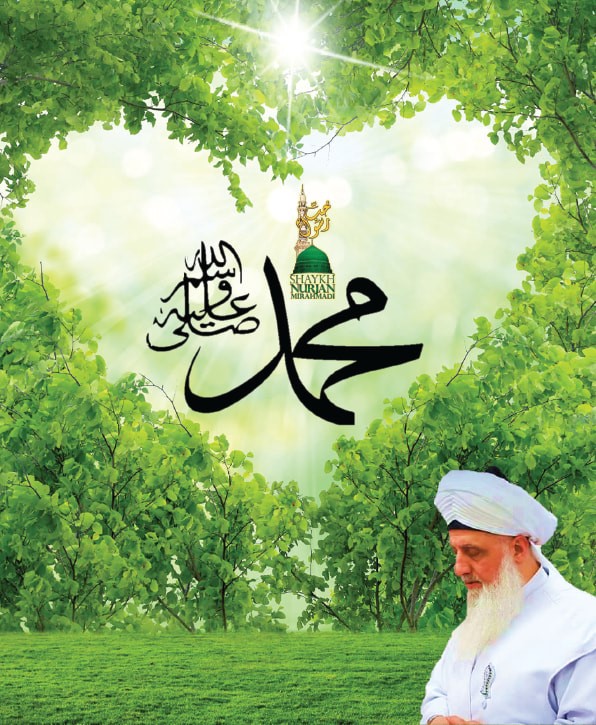 We pray that Allah (AJ) dress us and bless us in these holy nights and to be rewarded. Not from our actions but, ‘Ya Rabbi, for our love for Sayyidina Muhammad ﷺ. Grant us a reward to the equivalence of that love, ya Rabbi, that has no measure and no way of understanding. Grant us from the love that you have for Sayyidina Muhammad ﷺ. Dress us and bless us and forgive us, ya Rabbi, as we are the nation of Sayyidina Muhammad ﷺ.’
We pray that Allah (AJ) dress us and bless us in these holy nights and to be rewarded. Not from our actions but, ‘Ya Rabbi, for our love for Sayyidina Muhammad ﷺ. Grant us a reward to the equivalence of that love, ya Rabbi, that has no measure and no way of understanding. Grant us from the love that you have for Sayyidina Muhammad ﷺ. Dress us and bless us and forgive us, ya Rabbi, as we are the nation of Sayyidina Muhammad ﷺ.’
And that we don’t want to embarrass our beloved Sayyidina Muhammad ﷺ on the day of yawm e mahshar (day of resurrection), that we don’t want to come with any type of badness. That, ya Rabbi, grant us an honour so that to show the magnificent honour that you have placed upon the realtiy of Sayyidina Muhammad ﷺ.’ That not only the Rasul ﷺ is so beautiful but look at the beauty of his nation, they are adorned with lights and dresses. Ya Rabbi grant us from that reality, inshaAllah, ya Rabb.
The Shaykh Teaches Adab
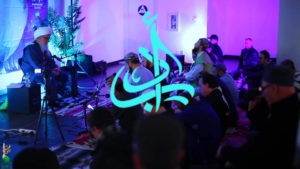 Tariqah (spiritual path) comes as a school of adab (manners). Sometimes by the nature of the shaykh he’s a very, again from the hadith (traditions of Prophet ﷺ) of Prophet ﷺ, ‘To lower your wings to people so that they find a familiarity in you and approach.’ And the tariqah’s basis, its barakah and blessings is adab. So, again no offence to anyone, but the Shaykh will teach how to keep the adab, how to respond, how to be playful, how not to be playful. How to keep the limits, so that that barakah (blessings) can flow. Once that limit is broken, the connection is lost. So, then the danger of drawing too near to a shaykh is that the limit and the boundary can become confused.
Tariqah (spiritual path) comes as a school of adab (manners). Sometimes by the nature of the shaykh he’s a very, again from the hadith (traditions of Prophet ﷺ) of Prophet ﷺ, ‘To lower your wings to people so that they find a familiarity in you and approach.’ And the tariqah’s basis, its barakah and blessings is adab. So, again no offence to anyone, but the Shaykh will teach how to keep the adab, how to respond, how to be playful, how not to be playful. How to keep the limits, so that that barakah (blessings) can flow. Once that limit is broken, the connection is lost. So, then the danger of drawing too near to a shaykh is that the limit and the boundary can become confused.
Now on the internet, there is no difference. The internet is going to be ten times harder because the person is at a distance and it becomes difficult to train. My concern for our moderators is that they should keep monitoring all comments. Now the comments have to be of a religious nature. They have to say, ‘MashAllah. Thank you. Great. I learned, alhamdulillah.’ That’s it.
Don’t Play in Shaitan’s Backyard
 Don’t make this familiar and like a hang out, because it’s not the backyard of shaitan, where we are all now playing in shaitan’s backyard and making weird faces and flowers, and romantic gestures, and inappropriate comments. Remember there are ulama (scholars) who are trying to attack us that will be watching these feeds. There are husbands watching and wondering why women would be making comments like this. There are women watching wondering why their husbands would be making comments.
Don’t make this familiar and like a hang out, because it’s not the backyard of shaitan, where we are all now playing in shaitan’s backyard and making weird faces and flowers, and romantic gestures, and inappropriate comments. Remember there are ulama (scholars) who are trying to attack us that will be watching these feeds. There are husbands watching and wondering why women would be making comments like this. There are women watching wondering why their husbands would be making comments.
So, it means this is a very dangerous backyard to be playing in. We are trying our best to do the teaching that’s appropriate. So, it’s just a reminder to ourselves that keep the comments very polite, very religious. Don’t make yourself familiar with us as we are not friends with anyone. We are just a teacher here, teaching the way towards Sayyidina Muhammad ﷺ. We are nobody’s buddy, and we are nobody’s friend. You may like us because of what we recommend and what we are teaching, that’s it. Keep that had and limit, if that’s lost then the whole association becomes like we are playing in shaitan’s (satans)backyard. And Allah (AJ) protect us from that type of difficulty.
Maintain Adab in Online Associations
Our moderators don’t have to do anything. Just take the comments and take it off. And later on they can message people, ‘Please just stick to religious comments, and this is nice alhamdulillah, mashAllah, that’s it.’ InshaAllah, it’s a reminder for myself because things are getting bizarre and we have family. We have family watching and logging on and all these people have family, wives, children that are watching. Your family looks at these comments and thinks, ‘This is kind of ajeeb (strange), what are all these things?’ So please, please, keep everything real straight. What we say in Farsi, ‘Sarsangi.’ Yeah, keep your head heavy [Shaykh laughs], it doesn’t translate like kebabs in paradise.
In Heaven There is Only Light
 We’re talking about the tables sent from heaven. If you ever think, when we ever think that we are going into heaven with bodies of light. And when they’re asking, ‘Ya Rabbi, that send us a table from heaven.’ People think like hot kebabs are coming down, but that table from heaven comes from the world of light. So, every kebab there is from the kebabs of light. And the angel would be astonished to see, ‘How are you going to eat that?’ So alhamdulillah, Allah (AJ) dress you, bless you and forgive me, inshaAllah.
We’re talking about the tables sent from heaven. If you ever think, when we ever think that we are going into heaven with bodies of light. And when they’re asking, ‘Ya Rabbi, that send us a table from heaven.’ People think like hot kebabs are coming down, but that table from heaven comes from the world of light. So, every kebab there is from the kebabs of light. And the angel would be astonished to see, ‘How are you going to eat that?’ So alhamdulillah, Allah (AJ) dress you, bless you and forgive me, inshaAllah.
Make Amends When You Wrong Someone
 And anytime we do something wrong, this is a side note on the ways of ma’rifah (gnosticism) and the ways of istighfar (seek forgiveness). That when we do something wrong in life, not only we ask Allah’s (AJ) forgiveness, if we have wronged someone, a person, then make an amends. Make an amends in our life to ask that person’s forgiveness. If you harm them with your talk and with your actions, and if you hurt their heart or broke their heart, this is something that’s very dear to Allah (AJ). That we try to make a life not going around, you know, breaking people’s hearts. So if we’re doing something wrong, the key to its success is make an amends and apologize to a person that you’ve harmed with your actions, and with your tongue.
And anytime we do something wrong, this is a side note on the ways of ma’rifah (gnosticism) and the ways of istighfar (seek forgiveness). That when we do something wrong in life, not only we ask Allah’s (AJ) forgiveness, if we have wronged someone, a person, then make an amends. Make an amends in our life to ask that person’s forgiveness. If you harm them with your talk and with your actions, and if you hurt their heart or broke their heart, this is something that’s very dear to Allah (AJ). That we try to make a life not going around, you know, breaking people’s hearts. So if we’re doing something wrong, the key to its success is make an amends and apologize to a person that you’ve harmed with your actions, and with your tongue.
Asking Forgiveness Tames the Ego
 One reality behind that, is that it’s very hard on your ego. Your ego hates it so much, that if you live by that standard, your ego will teach you, ‘Don’t bother this person,’ because again we’re going to have to go say, ‘I’m sorry,’ and I hate that more than the action that you did. But if you don’t and think, ‘I can harm people and just say, oh Rabbi, astaghfirullah, astaghfirullah,’ but it wasn’t Allah’s (AJ) issue.
One reality behind that, is that it’s very hard on your ego. Your ego hates it so much, that if you live by that standard, your ego will teach you, ‘Don’t bother this person,’ because again we’re going to have to go say, ‘I’m sorry,’ and I hate that more than the action that you did. But if you don’t and think, ‘I can harm people and just say, oh Rabbi, astaghfirullah, astaghfirullah,’ but it wasn’t Allah’s (AJ) issue.
The issue was with the person that we harmed or we came across, or we took their rights from them. So that person has to give a forgiveness in their heart. And that act of trying to do that is heavy on the nafs (ego). Until the nafs begin to warn you that, ‘Just okay better we don’t do those things so we don’t have to keep saying sorry to everybody’, and that becomes its own defense mechanism towards keeping good character, inshaAllah.
Subhana rabbika rabbal ‘izzati ‘amma yasifoon, wa salaamun ‘alal mursaleen, walhamdulillahi rabbil ‘aalameen. Bi hurmati Muhammad al-Mustafa wa bi siri Surat al-Fatiha.
Special thanks to our transcribers for their help with transcribing this suhbah.
Original Date of Suhbah: May 21, 2020
Related Articles:
- 9. Ramadan
- How to Accompany ‘Ibadullah – whom Allah has Taught
- Fighting Desires and Build Internal Energy – Nafs ammara
- Souls of Lovers of Prophet (saws) in Heart of Prophet (saws)
- Ramadan Mubarak May We be Blessed by Holy Qur’an
Please Donate and support us to spread these heavenly knowledges.
Copyright © 2020 Naqshbandi Islamic Center of Vancouver, All Rights Reserved.











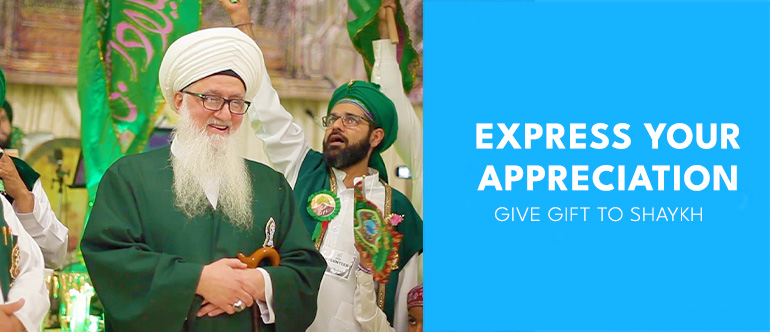

![Private: [ID: aYaQGqEVZoM] Youtube Automatic](https://nurmuhammad.com/wp-content/uploads/private-id-ayaqgqevzom-youtube-a-236x133.jpg)
